
It’s the perennial question. Who is better, Wilt Chamberlain or Bill Russell? Kareem Abdul-Jabbar or Larry Bird? Magic Johnson or Michael Jordan?
LeBron James has been in that conversation for some time. With his fourth NBA championship now in the record books, has the Los Angeles Lakers star secured his seat among the greats on basketball’s Olympus? Or is he the GOAT?
Where to begin? Arguably not enough is said of James’ remarkable consistency, given he’s made the NBA Finals in nine of the last 10 seasons, and 10 of the last 13.
True, if you’d ask anyone whether they’d take Michael Jordan’s six NBA titles in six Finals or James’ four in 10, they would take the Chicago Bulls star’s record.
Yet there is something seriously impressive about James’ record in itself.
Of those who have reached nine or more NBA Finals, alongside James, only Kareem Abdul-Jabbar did it with more than one team.
Abdul-Jabbar reached two with the Milwaukee Bucks and eight with the Lakers.
James is the only player to have gone to nine or more Finals across three different teams: five with the Cleveland Cavaliers, four with the Miami Heat and one with the Lakers. Wherever he goes, greatness follows.
Other greats of the modern era like Kobe Bryant, Tim Duncan and Shaquille O’Neal reached multiple finals, but none can match the consistent success that James has.
Yes, Bryant and Duncan have five titles to James’ four but the Lakers star is 35 and plays like he’s 25.
After securing his fourth NBA Finals MVP award this year, James is now the first player in NBA history to win the accolade with three different teams. Only Michael Jordan has more with six.
James could play for much longer. He could launch another Lakers dynasty. And he still has time on his side to break even more records.
‘It became personal with me’
Unfortunately for basketball fans, there was no crossover with James and Jordan.
Jordan retired for good at the end of the 2002/03 season, after two years with the Washington Wizards. That same season James was drafted No. 1 overall by his hometown Cleveland Cavaliers.
That hasn’t stopped the GOAT conversation.
When the Bulls drafted Jordan, as referenced in “The Last Dance” series, he inherited a “traveling cocaine circus.”
He took a perennially losing franchise which hadn’t had a winning season in nearly 10 years, put them on his shoulders, and dragged them all the way to the NBA playoffs every year that he played for the team, bringing the city its six NBA championships.
Similarly, James joined a Cleveland Cavaliers side in 2003 that over the previous five seasons had won just 130 games of a possible 378. He was also the hometown kid, expected to bring great things since he was in his early teens. Like Jordan, he turned a bottom feeder into a challenger.
James won only one title with Cleveland in the four NBA Finals he reached with the Cavaliers, but he did not have the caliber of supporting cast around him that Jordan did, notably Scottie Pippen and Dennis Rodman. And before Rodman, Jordan had Horace Grant.
James only got that kind of support in Miami when he formed a super team with Dwyane Wade and Chris Bosh, winning his first two NBA championships in the process and making the Finals in all four seasons he played down in South Beach.
He had some support on his return to Cleveland, with Kyrie Irving and Kevin Love, but Pippen and Rodman were Hall of Fame talents in their own right. Irving and Love have never played as well as they did with James.
That 2016 victory for the Cavaliers came against the rampant, dynastic Golden State Warriors team who were at one point leading the best-of-seven series 3-1. James’ legendary block of an Andre Iguodala layup in Game 7 was symbolic of his personal drive to secure victory for his team and the city of Cleveland.
James’ move to L.A. and the Lakers may appear to those outside of basketball as just a cynical, title-chasing move to the second most successful NBA franchise of all-time.
But the Lakers hadn’t made the playoffs or had a winning season since 2013.
When Lakers legend Kobe Bryant retired in 2016, the team finished with their worst ever season record of 17-65.In just two seasons, James led the team back to dominance and to its historical winning ways.
And in this year of all years, after the death of Bryant in January, with pressure on him to win a record-equaling 17th NBA title for the Lakers and to honor Bryant’s legacy, James delivered.
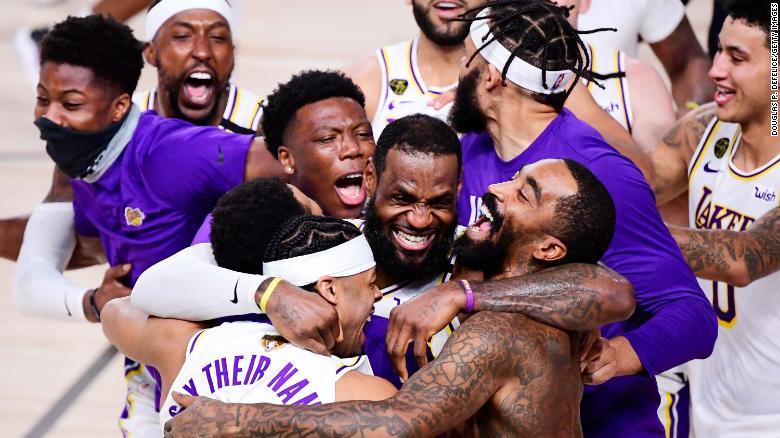

Measuring greatness
Basketball is a team sport where statistics reign. Metrics like points scored, percentage of shots made, accumulated rebounds and assists, and games won are where the sport and its players are judged.
But surely players shouldn’t be measured on statistics alone. And greats of the game should not be measured on play alone, but how they impact the sport, too.
The great Bill Russell won 11 NBA titles with the Boston Celtics between 1956-69. That’s a championship in all but two seasons of his playing career.
Yet basketball in the 50s and 60s was a completely different game to what we see today. The three-point shots that are so crucial to differentiating teams now didn’t even exist in the rulebook back then.
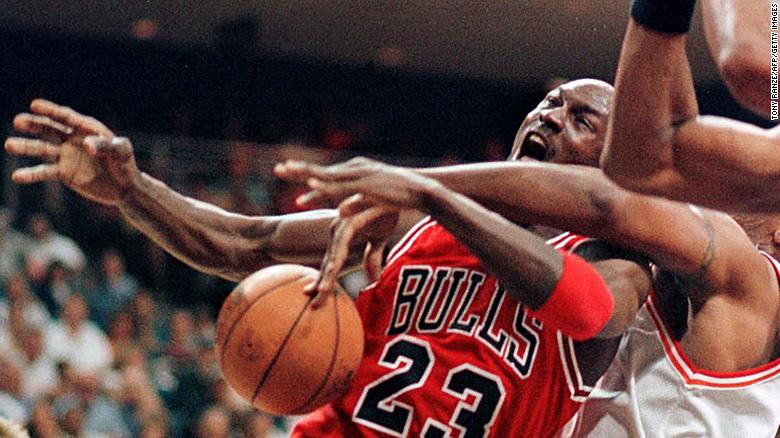

Likewise, “The Last Dance” was a reminder that basketball in the 80s and 90s appears brutally violent compared with the expressive and scoring-heavy version of the game played today.
Soccer manager Pep Guardiola has often advocated that a coach’s value or worth shouldn’t depend on how many titles or prizes they’ve won.
That’s an idea that is also true of players and might resonate with James Harden, who has led the league in points scored in the past three years, but despite that personal accolade, has zero titles to show for it.
So how do we measure a player’s impact on their team? And what importance should we give to a player’s impact on the game of basketball as a whole and the world around them?
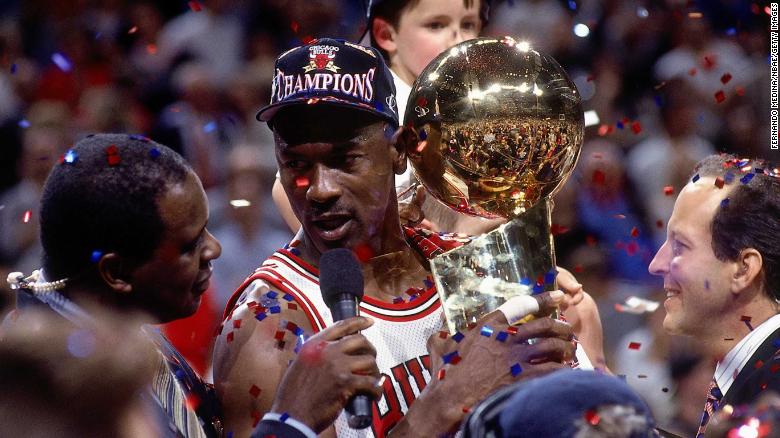

Jordan and James both turned around losing franchises and made them winners. James even brought the city of Cleveland its first major sport title in 52 years.
Jordan also changed basketball and the NBA for the better financially and culturally. He popularized the game globally. Without Jordan, the game wouldn’t have the platform it does today.
Jordan’s playing career and the business career born out of that has given him a reported net worth of $1.6 billion. James has also reportedly signed a $1 billion lifetime deal with Nike.
But James’ career hasn’t been about solely being great at basketball or making money.
Part of James’ greatness then comes from his influence over what the NBA and its players do with that platform.
In 2018, James set up the I Promise school that aims to provide an education for at-risk children in his hometown of Akron, Ohio. Guaranteed tuition to the University of Akron is also provided for all graduates of the school.
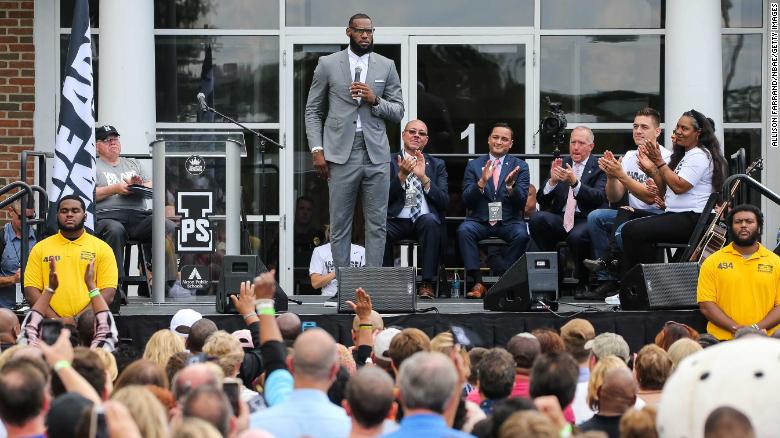

James’ “More Than An Athlete” slogan and campaigns have aimed to inspire others to strive for greatness in life.
In this year of all years, the NBA has been proactively using its platform. And so has James, with his More Than A Vote campaign driving to combat the suppressed Black vote in the US.
Fellow NBA veteran and President of the National Basketball Players’ Association Chris Paul has cited James’ activism as an inspiration to others in the league.
James has repeatedly involved himself in political discourse, even though he knows it could harm his image to sections of society. After he criticized Donald Trump, Fox News host Laura Ingraham famously said “shut up and dribble the ball.
“Jordan, on the other hand, reportedly stayed out of politics while playing because “Republicans buy sneakers, too.” Though he later said this was a comment made in jest, the point stands.
It should also be noted that in June, Jordan and the Jordan Brand announced a $100 million, 10-year pledge to “impact the fight against systemic racism.”
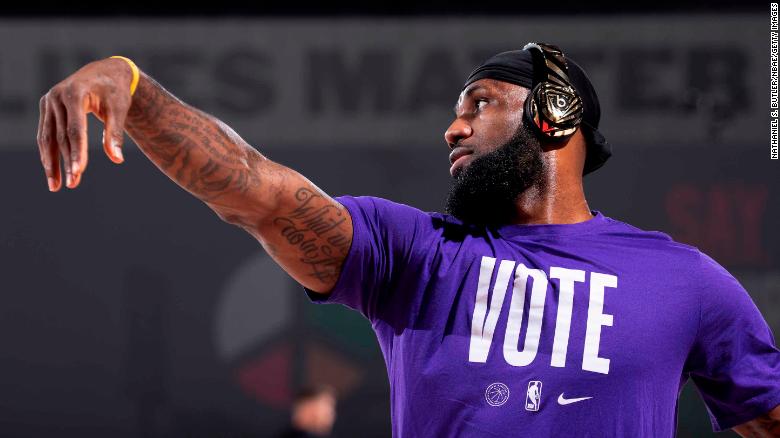

Speaking on Thursday of the social justice movement with players inside the NBA bubble, James said: “We know that being here has given us the strength and the numbers … That’s a byproduct of us being here, of being able to use this platform to be able to talk about everything that’s going on outside of the court.
“All the social injustice and the voter suppression and so many other things that are just going on. The police brutality and so on and so on and so on. Us being here and having the opportunity to talk about these issues and continuing to understand that this world is not just about basketball.
“Even though we live in a small piece of the game of basketball, there are so many bigger things and so many greater things going on. If you can make an impact or you can make a change or you can have a vision, it just helps out so much, not only in your community but all over the world.”
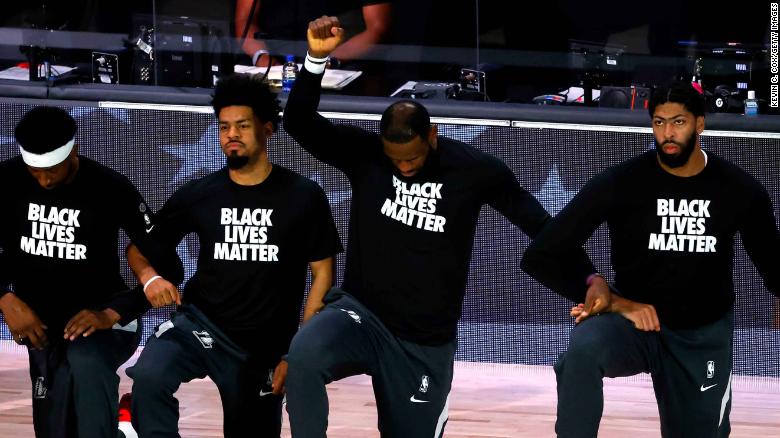

James’ commitment to correcting societal injustices is such that following the shooting of Jacob Blake in August, the Lakers were reportedly among two teams — along with the Clippers — to vote to end the NBA season early in protest. That would not have happened without James’ approval.
Going into the playoffs as the No. 1 seed, with an injury-plagued Golden State team nowhere near contention this year, James will have known this was his best chance in years to win a fourth NBA championship. Yet he jeopardized that for what he felt was a bigger issue.
That might not make James a better basketball player, but it certainly makes him great.


